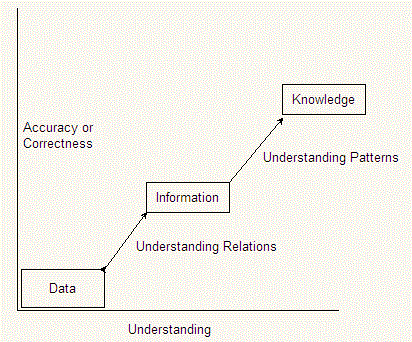This issue has been dealt with in each and every MIS text. The reason is that this issue is important from a conceptual standpoint in the study of MIS. The concepts of ‘Data’, ‘Information’ and ‘Knowledge’ are interlinked. In fact, data, information, knowledge and wisdom have been the building blocks of systems thinking and are sometimes referred in literature as DIK hierarchy. Data is raw facts, which is not of much use per se. When this data is processed it becomes information.
A simplistic way of connecting the above concepts is to consider information as the understanding of relations in the data and knowledge as the understanding of patterns in the information.

The management of information is largely the efficient management of data, which are the basic building blocks of information, If the data is not managed properly, information will not be generated, So even though data by itself is meaningless, it is vital for information management Poor data quality leads to a situation commonly known as ‘garbage in, garbage out’, where the information coming out of processing the data is also as meaningless as the data to start with was useless. In fact, the subject of information management largely deals only with the strategies for managing data.
Deriving knowledge from information however, is a more difficult challenge. Information can be stored in specific systems to create organizational memory and organizational learning. The problem with managing knowledge is that it is largely contextual with a strong experiential bias making replication a big problem. Knowledge management is an issue that needs detailed discussion, which we shall revisit later.
Consider the following statements:
- I have two boxes connected by wires.
- Box one is moderately heavy and boxes two is lighter.
- Box one has a glassy front view with 3-4 buttons in front
- Box two also has 3-4 buttons but no glassy frontal part.
- You usually find the boxes in a study with smaller gadgets attached to it through wires.
- Gadget one has a lot of push buttons with alphabetical and numerical characters printed over each button and the other gadget, gadget two fits into a palm and has a roller ball underneath with two buttons on top.
- When a button of box two is pressed, box one initially shows characters in the frontal glassy part and then lights up like a television.
Can you guess what it is?
Yes it is the description of a personal computer. Somewhere, while reading the statements you could match the pattern of a personal computer’s description with the statements above. When you started reading the statements in a sequence, the statements must have meant nothing at all to you but somewhere you could match the pattern based on your knowledge and then on, the other statements were only a confirmation of your understanding. However, if you would not have seen a computer in your life, you would not have been able to identify the statements as describing a computer. This is what knowledge is. Knowledge helps you to make meaning of the information at your disposal. Each statement is information as each statement is complete and has meaning. However, the value of such information is very low as it does not convey any decision-making .value to you. The fact that there are two boxes and two gadgets attached to the boxes are data which in themselves convey neither information nor knowledge.
 Dinesh Thakur holds an B.C.A, MCDBA, MCSD certifications. Dinesh authors the hugely popular
Dinesh Thakur holds an B.C.A, MCDBA, MCSD certifications. Dinesh authors the hugely popular